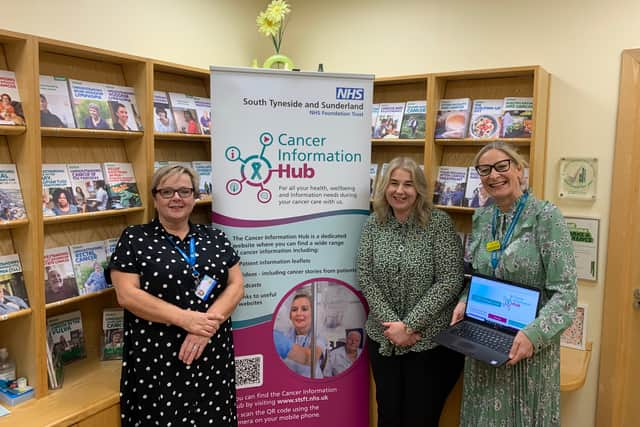South Tyneside and Sunderland NHS Foundation Trust ranked among best for cancer care by patients
and live on Freeview channel 276
The latest results in the National Cancer Patient Experience Survey for 2022 show STSFT performing above the national average in a range of areas. Patients in South Tyneside and Sunderland gave their cancer care a glowing report:
- 93% felt they had enough information in advance about diagnostic tests
Advertisement
Hide AdAdvertisement
Hide Ad- 94% said they had a main point of contact for advice and support
- 94% had a care plan in place to address any needs or concerns
- 90% felt information was easy to understand about what to do after leaving hospital
- 91% said the whole care team worked well together.
STSFT also scored well above national average in a number of key areas of hospital-based care. This included 81% of patients feeling they were always able to get help from ward staff when needed Trust (above the national average of 73%). Patients also felt that the length of time they had to wait when they arrived at clinic and or on the chemotherapy day units for treatment, was about right 88%. This was 10% above the national average of 78%.
Advertisement
Hide AdAdvertisement
Hide AdSpecialist teams at South Tyneside and Sunderland NHS Foundation Trust provide care for thousands of patients with cancer every year. This includes a number of specialist cancer services including treatment for urological cancers such as penile cancer and head and neck cancer.
The Trust is also now one of only three specialist centres in the region with PET-CT scanning capability which is helping to diagnose more cancer patients sooner.
Read South Tyneside's news on the go with our free email newsletters - bringing the headlines to your inbox. Catch up on the day's news and sport and enjoy even more from your Gazette. Visit our website here to find out more and sign up.


Last year, the Trust launched a new Cancer Information Hub on its website, offering a one-stop shop for information on a host of subjects. They include how to manage symptoms, treatments, tests and scans, screening and patient stories.
Advertisement
Hide AdAdvertisement
Hide AdKelly Craggs is the Trust’s Macmillan Cancer Lead Nurse. She said: “Overall, these results are extremely positive and show that our fantastic teams are delivering really good care to people in South Tyneside and Sunderland.
“Going through a cancer diagnosis is a really difficult time for patients and their loved ones and there’s also what comes after that, whether they’re on a journey of recovery, living with cancer or need palliative care. Our staff have a really important job to do every step of the way and listening to patients is a really important part of that.
“Surveys like these mean we can understand what matters most to people when they are on a cancer treatment pathway and look at what we can do to make their experience of care as seamless as possible.”
Advertisement
Hide AdAdvertisement
Hide AdThe latest results for 2022 show how South Tyneside and Sunderland NHS Foundation Trust is rated by its patients, as well as how it compares to others. Patients were asked to fill in the survey between April to June last year, with 1,134 completing the questionnaire.
Questions cover their initial referral from a GP, the tests used to find a diagnosis, how they were given information, what they thought about their hospital care and discussions about long and short-term side effects. They also looked at what support had been made available at home, as well as the emotional support on offer from community and voluntary services as they lived with cancer or after their treatment had come to an end.
